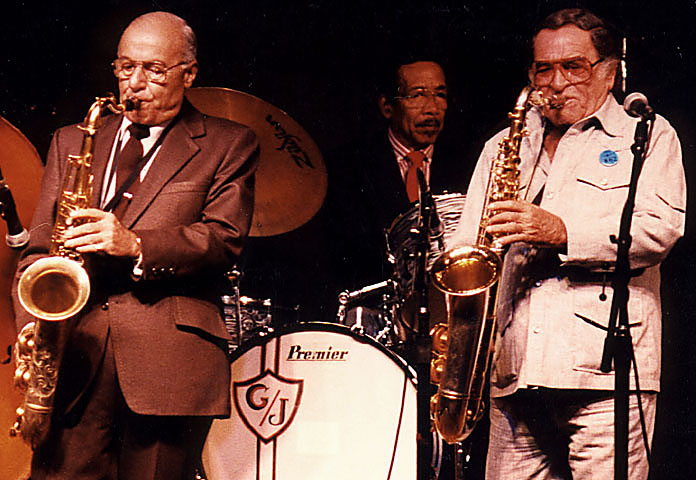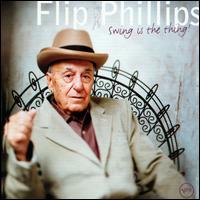

Courtesy of Flip Phillips
(pictured on the left)

Verve Records
A
FIRESIDE CHAT WITH FLIP PHILLIPS
Flip
Phillips has been around to see both World Wars (although he was in diapers
for the first one). That is a long time. You would think a musician that
has been around that long, no, a person who has been around that long,
would be celebrated, but no. There is no tribute for Phillips. No birthday
celebrations are in order. Phillips, who was a superstar during his time
with Norman Granz's Jazz at the Philharmonic, would even be a mystery
to me if it hadn't been for Verve releasing his latest, Swing is the Thing.
Not bad for an eighty-five-year-old. Not bad even for a twenty-five-year-old.
And that is a testament to Phillips' forever young chops and his enduring
love for swing. I bring to you, Flip Phillips, unedited and in his own
words.
FRED JUNG: Let's start from the beginning.
FLIP PHILLIPS: I was twelve years old when I started. My cousin was a
very excellent saxophone player and a clarinet player and I looked up
to him. He was one of my idols. I wanted to play like him. That is how
he bought me my first clarinet. From then on, I would rather play than
eat.
FJ: When did you make the switch to playing the tenor exclusively?
FLIP PHILLIPS: Oh, I had the saxophone in 1929. In 1929, I had an alto
saxophone and in 1930, or '31, I still had the alto. I was playing mostly
clarinet though. For me, the tenor saxophone was the happy medium of all
horns. I loved the sound of it. You could play like an alto. You could
play like a baritone. You could play like a trumpet. It was the happy
medium of all horns. The sound that I made on the tenor was beautiful
and that is when I made the switch. I could do certain things on the tenor
that you couldn't do on a clarinet or any other instrument. For me, it
was one of the best sounds that I could think of that I heard at that
time.
FJ: Your thoughts on Benny Goodman, whom you played with sporadically
for a number of years.
FLIP PHILLIPS: The first time I met him, I went to hear him and he was
a great clarinet player. He was a perfectionist. And as years went by,
I got to know him more and more and I played with him over the early years
and later years, in 1958, '59, we were a lot older and more mature. To
me, he was a perfectionist. He'd have clarinet in the morning and I'd
have coffee in the morning. The first thing he put in his mouth was clarinet,
not coffee. He practiced. He loved to practice, which I gave him a lot
of credit for. To me, he was the greatest clarinet player around at that
time.
FJ: And Woody Herman.
FLIP PHILLIPS: Well, Woody was a different leader. Woody was a great organizer.
As a clarinet player, he didn't come up to Benny, but he did it the Woody
Herman way. If Woody knew a guy could play, he let him play. He'd hold
the microphone for you.
FJ: So Herman gave you a good deal of freedom?
FLIP PHILLIPS: Oh yeah, more freedom than anybody. I grew all the time,
all the time.
FJ: From there, you went center stage with Norman Granz's Jazz at the
Philharmonic tour.
FLIP PHILLIPS: Norman knew that the band was breaking up and he called
me right away. When he called I said, "I want to take a little rest and
I will talk to you later." I had just come off the road. So I said, "I'll
take a little rest and I'll talk to you later." I went with them. I started
in 1946 and stayed with them for eleven years.
FJ: Much like the armed forces slogan, Jazz at the Philharmonic, was join
the JAP and see the world.
FLIP PHILLIPS: We toured every place. I did see the world, all over the
world. And there was nothing like it. Jazz at the Philharmonic was the
greatest thing that happened in music.
FJ: What was it about the Jazz at the Philharmonic tours that left such
an indelible impact on jazz music?
FLIP PHILLIPS: It had to be. Whoever was on Jazz at the Philharmonic was
the best in the world. The musicians that he had were the best in the
world, the best in the world. The best jazz players in the world, not
only in the country, but in the world. Nobody but Norman Granz could put
them together the way he did. He had the best trumpet players, the best
saxophone players, the best rhythm players, the best singers. He had the
best. There was nothing better than Jazz at the Philharmonic at the time
and there never will be.
FJ: You had an originality at a time when the prevailing sentiment was
to sound like Lester Young.
FLIP PHILLIPS: Well, I wanted to play like I play. I admired every saxophone
player there is. I admired every one. They used to interview me and say,
"Who is the best?" I'd say, "There is no best. They are all great. Every
single one of the players that I know, every saxophone player that I know
is the best in his field." So I cannot pinpoint and say that is the best.
Some people like ice cream and some people like oysters. Some like steak.
Some like chicken. They are all good. They are all great players, everyone
I knew. I admired every single one. I played with the best. I played with
everybody. I played with the best.
FJ: Give me a roll call of some of those players.
FLIP PHILLIPS: They were the best in the world. You have got the saxophone
players like Stan Getz, Coleman Hawkins, Lester Young, Ben Webster, Sonny
Stitt, Illinois Jacquet, all good players. Trumpets, you had Dizzy Gillespie,
Roy Eldridge, Charlie Shavers, Harry Edison. Trombone players, you had
Bill Harris, J. J. Johnson. I could go on and on. Everybody I met were
good.
FJ: What excellent motivation to play better?
FLIP PHILLIPS: It is supposed to. With all those players, you look up
and there it is. Everybody was a giant. And when the Jazz at the Philharmonic
ended, I was still playing other jobs.
FJ: Let's touch on your new release on Verve, Swing is the Thing!
FLIP PHILLIPS: We (Howard Alden, guitar; Kenny Washington, drums; Christian
McBride, bass; Benny Green, piano; James Carter, tenor saxophone; Joe
Lovano, tenor saxophone) went into the studio last October. We went into
the studio and everyone, on the first tune I called, we all got together
and played it and that was it. They all played great. And there was no
doubt about it. Every single one of those guys are great players. That
is why the album is called Swing is the Thing! Everyone of them were swinging,
every single one. No doubt about it. We just played one tune and we looked
at each other and they all smiled. That is all I had to see. And from
then on, it was a cinch.
FJ: Is swing the thing?
FLIP PHILLIPS: That's right. You better believe it. I never heard of swing
is not the thing.
FJ: How old are you now?
FLIP PHILLIPS: Eighty-five. In fifteen years I'll be a hundred.
FJ: We will have to call Willard Scott.
FLIP PHILLIPS: (Laughing) Yeah.
FJ: Do you still practice daily?
FLIP PHILLIPS: No, I should, but it's once in a while. I still love to
play, but the horn is getting heavier and heavier hanging on my neck (laughing).
FJ: Tour plans?
FLIP PHILLIPS: It is difficult for any tour for me. I'm moving a little
slower now. I'm still alive. I'm talking, I think. Whatever I am doing
now is a bonus, a big bonus.
FJ: Can we expect a follow-up to Swing is the Thing?
FLIP PHILLIPS: I hope so. I think so. I hope I will be able to.
FJ: So what is next for Flip Phillips?
FLIP PHILLIPS: I get up in the morning and I take a bow. And I say, "Well,
I made it." I get up, take a bow, and I applaud. I take it one day at
a time. That is all I can take, one day at a time. I'm glad to be alive.
Fred Jung is the Editor-In-Chief and prefers the Michael Keaton Batman.
Comments? Email Him.